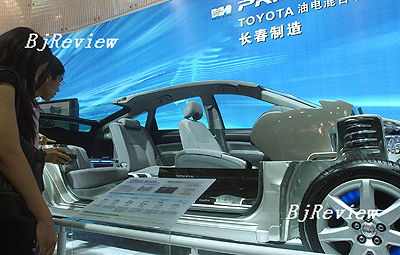
While people enjoy the pleasure and convenience of driving, they are also creating and breathing more and more toxic emissions.
By the end of 2006, Chinese vehicle production had ranked third in the world, behind only the United States and Japan. Between 2005 and 2020, it is estimated that Chinese car ownership will increase 15 percent annually. This increase will pose serious challenges to energy resources and to the stability of the environment.
In major cities like Beijing, Shanghai and Guangzhou, 80 percent of the carbon dioxide and 40 percent of the nitrogen oxide come from vehicles, according to China Association of Automobile Manufacturers. Those emissions contribute to the greenhouse effect, deplete the ozone layer and generate acid rain and black rain.
In order to protect the environment, the National Reform and Development Commission published a new emission standard at the beginning of August, and 444 types of cars were suspended from production due to their failure to meet the new standard.
Hybrid predicament
Car manufacturers have two ways to lower emissions-either by using diesel or by producing hybrid powered engines.
At present, diesel cars are popular in the European market as diesel emissions are much lower than regular gasoline. However, very few Chinese choose to drive diesel-powered cars because “domestic diesel quality is very low,” said Yang Baogang, a lamp supplier who drives a Nissan car. “Car engines, especially good ones, will be easily damaged if they use low-quality diesel, as it will block the fuel injection system,” he said. Yang argues that even if gasoline prices are more expensive than diesel, he’d rather use gasoline.
International car manufacturers are researching and developing mixed-power hybrid vehicles driven by gasoline and electricity. Though they have made progress in mature markets in the United States and the EU, they are still struggling to expand sales into the Chinese market.
Government jump starts
In an attempt to lead by example, the government is pledging to use more environmentally friendly cars.
In early August, the State Council issued a notice calling for “green procurement,” which features compulsory local government procurement of energy-conserving and environmentally friendly products. Car procurement is one of the key subjects and the government has promulgated a list of standards that the cars must reach.
Li Zhenghui, Pubic Relations Manager of Shanghai General Motors, said the government practice actually points in the right direction for auto industry’s development-low quality, heavily polluting cars will eventually fall into disuse. Shanghai General Motors is one of the automakers that meets the environmental standards the government is promoting. Li said Shanghai General Motors has closely followed the government intentions.
“The government has set a good example for domestic car consumption and will definitely improve the technological level and core competitiveness of the Chinese auto industry,” said Li Tienan, senior official with General Administration of Quality Supervision, Inspection and Quarantine. “The government practice will encourage citizens to buy subcompact and environmentally friendly cars instead of big vehicles that contribute to huge air pollution.”
Xie Weilie, an auto industry commentator, said that auto manufacturers usually don’t care about such things as pollution and energy, unless there are compulsory regulations or market encouragement.
However, Xie argued it is not enough to restrict oil consumption and exhaust gas emissions. In mature markets like Europe and the United States, other issues-for instance, using environmentally friendly material to build a car or the reclaimation of disused cars-have to be put on the agenda. But China currently is only focused on emission control and is still lagging behind major auto manufacturing countries, Xie said.
|
What can we do?
Stop driving a car at least once a month to reduce the emission of toxic gas
Choose small and subcompact cars that use less gasoline
Don’t litter outside the car window to maintain clean streets
Go to registered and reputable car wash facilities to wash your car, since they use reclaimed wastewater.
Learn to drive a car more economically and burn less
gasoline
|
| 